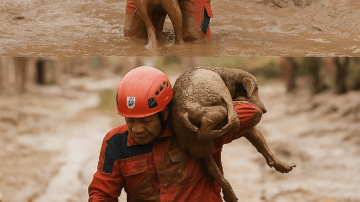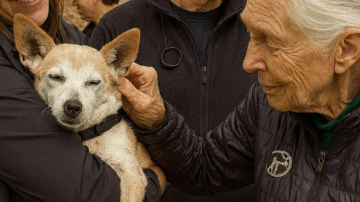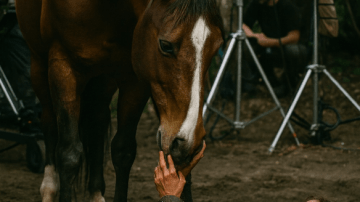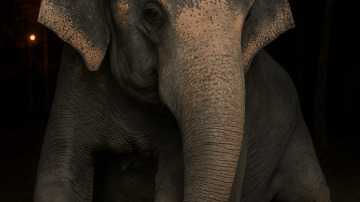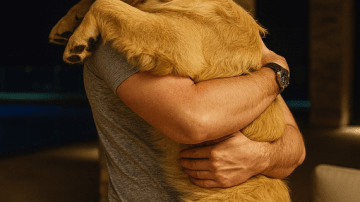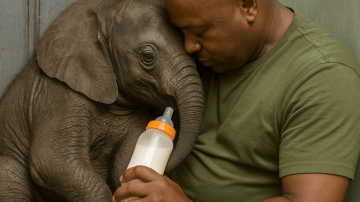At first there was only silence. The heavy kind that comes after something precious has been taken away. The clearing where the herd once passed was still, but in the middle of it stood one small elephant who did not understand why the world had suddenly become so empty.

His name would later be Kavi. A name that means poet. A name chosen because even in grief he carried a quiet kind of beauty.
Only hours earlier the forest had echoed with a gunshot. Rangers had rushed toward the sound and found a mother elephant on the ground, tusks stolen, life gone. Beside her stood her calf, nudging at her, pressing his small head against her side, waiting for her to get up.
He did not understand death. He only understood that the one who was always there was not breathing. He made no loud trumpet, no wild cry, only a soft, broken whimper. As if he was afraid to make noise without her.
When the rescue team approached, Kavi panicked. He swung his little trunk and stepped backward, eyes wide and shining with confusion. His whole body shook, not from cold, but from the ache of a baby who had lost his whole world.
It took hours for the team to reach him. They spoke softly, always slowly, never rushing. They gave him space. Grief in an elephant is like grief in a child. It cannot be hurried.
At last they were able to guide him toward the truck. Even then he trembled the whole way. He turned his head again and again toward the place where his mother lay. He kept looking back.
At the elephant orphanage Kavi refused to eat. His keepers brought fresh milk, fruit, sweet leaves, even warm water. He ignored it all. He stood in one corner of the enclosure facing the wall, his trunk hanging limp.
He was not hungry for food. He was hungry for a heartbeat.
The staff worried. Baby elephants can die from sorrow. They can give up because the one voice they knew is gone. The orphanage had seen this before and they knew what he needed was not just medicine. He needed a mother.
So they called Meera.
Meera was small and gentle, with hair pulled back and hands that knew how to heal. She had raised many orphaned elephants. She knew their moods, their fears, their tender places. More than that, she knew how to be patient.
The first time she entered Kavi’s enclosure he flinched. She did not reach for him. She did not force him to come close. She simply sat down on the straw, legs folded beneath her, and began to speak.
Her voice was soft, warm, and steady. She told him stories of rain and riverbeds and tall grass. She talked the way mothers talk to frightened children. Not about rules, but about safety.
Hours passed and she did not leave. Workers came and went. The sun shifted. Meera stayed.
By evening she had moved a little closer. Kavi flicked his ears at the sound of her humming. It was an old lullaby from her village, the same one she had sung to her own children when storms rattled the roof.
When she finally stretched out her hand, Kavi did not run. He stared at it for a long moment, as if trying to decide whether hands could be trusted. Then slowly, very slowly, he touched her fingers with the tip of his trunk.
It was small, almost nothing. But to everyone watching, it was the first crack in the wall of grief. It was a beginning.
From that day Meera became his constant. Every few hours she brought him bottles of warm milk, holding it for him the way a mother holds a bottle for her baby. She cleaned the rough patches on his skin where he had brushed against branches trying to wake his mother. She walked beside him through the small forest paths so he could learn to forage.
But more than food and walks and medicine, she gave him presence. She was simply there.
Kavi followed her like a shadow. If she stopped, he stopped. If she bent to pick up a fallen leaf, he curled his trunk around her shoulder as if to say, do not go far. When thunder rolled across the sky and the other calves huddled together, Kavi pressed himself against her legs and trembled until the storm passed.
Every night Meera refused to sleep in the staff hut. She dragged a small cot into Kavi’s enclosure and slept where he could see her. Sometimes in the middle of the night he would twitch and let out a frightened sound. Without even opening her eyes, Meera would reach out and place her hand on his head.
“You are safe, my boy,” she whispered. “You are safe now.”
Little by little the change came. First he tasted the milk properly. Then he reached for the fruit. Then he splashed in the mud pool beside the other calves, sending water everywhere, pausing every few seconds to check if Meera was still watching.
His eyes grew brighter. His steps became sure. He learned to trumpet again. At first it was a shy little sound, unsure, almost embarrassed. Then it grew louder, clearer, a real elephant’s call, rolling out over the trees.
The other keepers smiled whenever they saw him with Meera. “He follows her like a son,” one of them said. And it was true. He did not just rely on her for food. He trusted her with his fear.
For Meera, it was more than a job. She had lost her husband years before. Her children were grown and lived far away. Mothering orphaned elephants had filled a quiet ache in her life. But Kavi was different.
“Kavi asked me why,” she once told another keeper. “Not with words. With his eyes. He asked why love can disappear so quickly.” She could not tell him why poachers came. Why greed took his mother. But she could show him that love also stays.
So she loved him every day. In the way she spoke. In the way she waited. In the way she never hurried him when he was scared.
Months passed. Kavi grew stronger. His ears fanned wide when he ran. His trunk curled confidently around branches. He played with the other young elephants, chasing birds, knocking over buckets, splashing in puddles.
But every morning, when Meera walked through the gate, he ran to her. Not walked. Ran. Trumpeting in joy, trunk reaching, as if sunrise itself had arrived.
One year after his rescue the staff knew it was time. Kavi was ready to join the older elephants in the open forest enclosure. This was the step every orphaned calf needed to take. If they were to live as elephants, they had to learn to be with their own.
Meera knew it was the right thing. But her chest tightened as she watched him. Letting go is one of love’s hardest tasks.
That morning she walked by his side, hand resting on his neck. Ahead, the older elephants waited, calling out in deep, welcoming rumbles. The forest opened before him like a promise.
Kavi hesitated. Then he turned back to her.
He wrapped his trunk around her waist and held on, not roughly, but with a slow, lingering pressure that said everything words could not. Meera pressed her forehead to his and breathed in the warm, grassy scent of him.
“Go on, my boy,” she whispered. “You are ready.”
He released her. Slowly. Reluctantly. Then he walked toward the others.
She stood there long after he disappeared among the trees. Her eyes were wet, but her heart was full. She had not just saved an elephant. She had watched a heart learn to beat again.
Months later she visited the forest area. The herd appeared at the sound of her voice, dust clouds rising around them. Among them was Kavi, no longer the frightened calf in the corner, but a young bull, strong and beautiful.
When he saw her he stopped. For a second she wondered if he would remember.
Then he came.
He rushed forward, trumpeting, trunk raised, joy pouring from him like sunlight. He curled his massive trunk around her shoulders, as gentle as he had been on the first day. He lowered his head to her, and for a moment, time folded.
The little orphaned elephant was still there. He had simply grown around his healing.
Kavi’s story traveled far beyond the sanctuary. People shared it because it reminded them of something important. That grief is real. That loss is heavy. But that love, when offered steadily, can pull even the smallest heart back from the edge.
Sometimes healing is not about forgetting what happened. It is about finding someone who will stand beside you until the memory no longer hurts as much. Someone whose heartbeat tells you that you are not alone.
That is what Meera did for Kavi. And in her quiet way, that is what Kavi did for Meera.
In a world that can be loud with cruelty, their story whispers a softer truth. Kindness still matters. Staying still matters. Answering a broken heart with patience still matters.
Love, once given, does not vanish. It changes shape. It becomes safety. It becomes trust. It becomes the warm weight of a small elephant leaning into the woman who refused to walk away.

